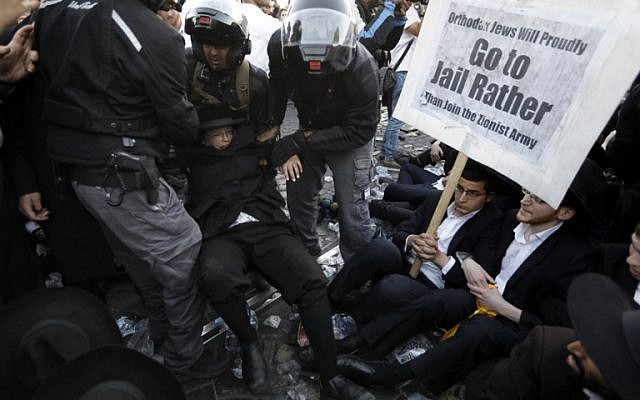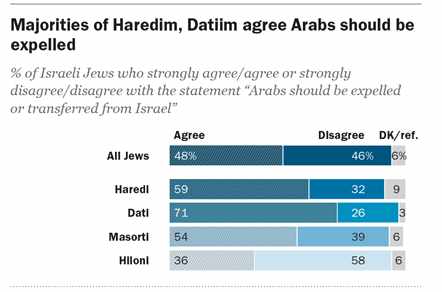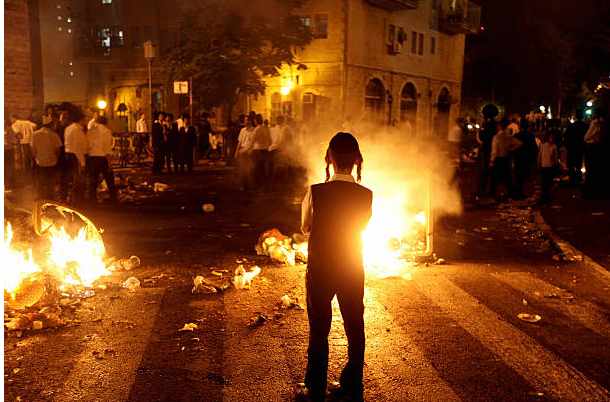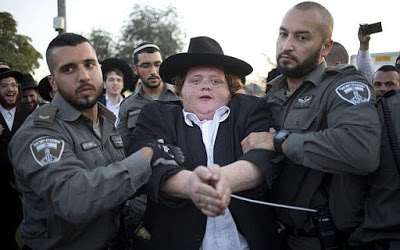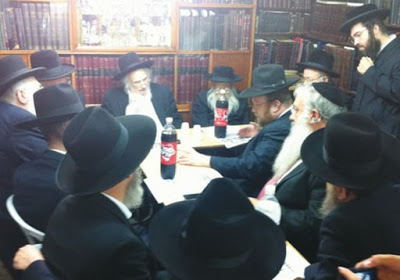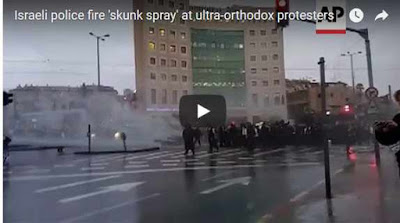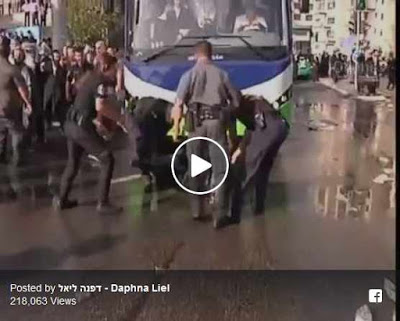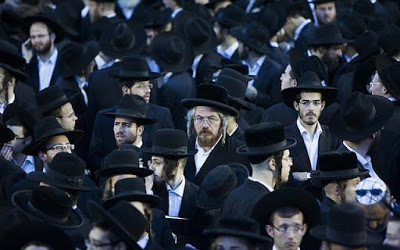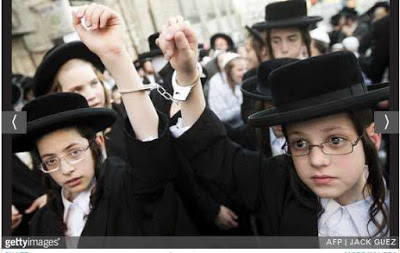Clashing with the Jewish state: ultra-Orthodox Israelis who reject Zionism
This is a fascinating
article on the 30,000 or so Jews who live in Mea Shearim, Jerusalem and who still reject
the Zionist State of Israel. It is
little known that when the Zionist settlers first came to Palestine from the
1880’s onwards they met little sympathy from the existing, Orthodox
Jewish community. The Zionist settlement
became known as the Yishuv. The existing
Jews were known as the Old Yishuv.
Chaim
Weizmann, Israel’s first President wrote disparagingly of them in his autobiography,
Trial and Error (pp. 225-9)
Weizmann, Israel’s first President wrote disparagingly of them in his autobiography,
Trial and Error (pp. 225-9)
Although it is now in the
ruling coalition in Israel today as United Torah Judaism, Agudat Yisrael was
formed in 1912 in Katowice, Polish as an anti-Zionist organisation. In 1924 the first Zionist assassination of a Jewish
anti-Zionist was that of Jacob de Haan, a Dutch Jew and one of the main spokesman
for Agudat.
ruling coalition in Israel today as United Torah Judaism, Agudat Yisrael was
formed in 1912 in Katowice, Polish as an anti-Zionist organisation. In 1924 the first Zionist assassination of a Jewish
anti-Zionist was that of Jacob de Haan, a Dutch Jew and one of the main spokesman
for Agudat.
In the Pew Research
Centre’s survey Israel’s
Religiously Divided Society 59% of Haredit (ultra-Orthodox Jews) favour expelling
Israel’s Arabs from the country compared to 32% who are opposed, so one shouldn’t
see the struggle against conscription as therefore translating into support for
the Palestinians. It does amongst a few
but it shouldn’t be over exaggerated.
This compares to 48% of Israeli’s supporting expulsion and 46% opposing
overall.
Centre’s survey Israel’s
Religiously Divided Society 59% of Haredit (ultra-Orthodox Jews) favour expelling
Israel’s Arabs from the country compared to 32% who are opposed, so one shouldn’t
see the struggle against conscription as therefore translating into support for
the Palestinians. It does amongst a few
but it shouldn’t be over exaggerated.
This compares to 48% of Israeli’s supporting expulsion and 46% opposing
overall.
Of course some of their views, such as
on gender segregation, gay rights etc. will not appeal to people. Nonetheless one has to admire their
determination to resist the draft and induction into Israel’s murderous
army. Not much point in believing in gay
rights if you are prepared to massacre on an equal rights basis!
on gender segregation, gay rights etc. will not appeal to people. Nonetheless one has to admire their
determination to resist the draft and induction into Israel’s murderous
army. Not much point in believing in gay
rights if you are prepared to massacre on an equal rights basis!
Tony Greenstein
Jaclynn Ashly on March 22, 2018
An
ultra-Orthodox Jewish demonstrators stand next to burning garbage container
during a protest against the opening of a parking lot during the sabbath on the
outskirts of Jerusalem’s conservative neighbourhood of Mea Sharim on June 27,
2009. (Photo: AFP/Menahem Kahana)
ultra-Orthodox Jewish demonstrators stand next to burning garbage container
during a protest against the opening of a parking lot during the sabbath on the
outskirts of Jerusalem’s conservative neighbourhood of Mea Sharim on June 27,
2009. (Photo: AFP/Menahem Kahana)
Before the sun has a chance to rise, Israeli riot police tiptoe through
one of Jerusalem’s oldest Jewish neighborhoods, their shadows dancing across
lines of anti-Zionist graffiti decorating buildings and walls.
one of Jerusalem’s oldest Jewish neighborhoods, their shadows dancing across
lines of anti-Zionist graffiti decorating buildings and walls.
Their objective is to arrest residents in Mea Shearim for refusing
Israel’s mandatory army draft and organizing against the state, according to
community claims. They say such raids have occurred on a near nightly basis in
the neighborhood for decades. However, in recent years Israel’s police
operations have escalated in Mea Shearim.
Israel’s mandatory army draft and organizing against the state, according to
community claims. They say such raids have occurred on a near nightly basis in
the neighborhood for decades. However, in recent years Israel’s police
operations have escalated in Mea Shearim.
In their telling, when Israeli forces break into homes during
these overnight raids, ultra-Orthodox residents are dragged out of their beds
and thrown into police vans.
these overnight raids, ultra-Orthodox residents are dragged out of their beds
and thrown into police vans.
Many in Mea Shearim, established in 1874, are part of the Eda Haredit,
“Congregation of God-fearers” in English — an ultra-Orthodox group in
Jerusalem that is also fiercely anti-Zionist.
“Congregation of God-fearers” in English — an ultra-Orthodox group in
Jerusalem that is also fiercely anti-Zionist.
Israeli police spokesperson Micky Rosenfeld described a less recurrent
scene. He was not able to provide the numbers of arrests carried out in the
neighborhood over the past few months, but told Mondoweiss police
units do not normally carry out night raids “unless there are specific individuals who the police know were involved
in illegal demonstrations.”
scene. He was not able to provide the numbers of arrests carried out in the
neighborhood over the past few months, but told Mondoweiss police
units do not normally carry out night raids “unless there are specific individuals who the police know were involved
in illegal demonstrations.”
The Eda Haredit opposes the Israeli state and any attempts at
assimilating them into the larger Israeli society. The cloistered neighborhood
of Mea Shearim has become a symbol for the group, whose members insulate
themselves from state institutions and affairs as much as possible.
assimilating them into the larger Israeli society. The cloistered neighborhood
of Mea Shearim has become a symbol for the group, whose members insulate
themselves from state institutions and affairs as much as possible.
Eda Haredit members also reside in the Jerusalem-area city of Beit
Shemesh and Safed in northern Israel.
Shemesh and Safed in northern Israel.
Many of the group’s members are descendants of the Old Yishuv, Jews who
resided in historic Palestine under Ottoman and then British rule.
resided in historic Palestine under Ottoman and then British rule.
Outside the homes of many Eda Haredit members in Mea Shearim hang signs
that read: “Here lives a non-Zionist
Jew.” Palestinian flags fluttering outside homes are a common sight here.
that read: “Here lives a non-Zionist
Jew.” Palestinian flags fluttering outside homes are a common sight here.
Eda Haredit members can often be found protesting the state and Israel’s
army draft on the streets of Jerusalem. Israeli forces typically respond by
dousing them in skunk spray – a noxious smelling liquid.
army draft on the streets of Jerusalem. Israeli forces typically respond by
dousing them in skunk spray – a noxious smelling liquid.
The members come prepared, even wrapping their black, wide-brimmed hats
in protective plastic. When Israeli police releases skunk spray on the
protesters, instead of running away, Eda Haredit members often sing and dance
as the putrid concoction rains down on them.
in protective plastic. When Israeli police releases skunk spray on the
protesters, instead of running away, Eda Haredit members often sing and dance
as the putrid concoction rains down on them.
The Israeli police have been accused of using excessive force on
the demonstrators, including severely beating unarmed Eda Haredit members.
the demonstrators, including severely beating unarmed Eda Haredit members.
A century-long anti-Zionist struggle
Mordechai Mintzberg, a rabbi in Mea Shearim whose family resided in
historic Palestine generations before Israel was founded, told Mondoweiss
that the establishment of the Eda Haredit was a “counter reaction” to Zionism in the early 20th century.
historic Palestine generations before Israel was founded, told Mondoweiss
that the establishment of the Eda Haredit was a “counter reaction” to Zionism in the early 20th century.
According to Mintzberg, as Zionists tightened their grip on the British
Mandate of Palestine following the Balfour Declaration in 1917, Jews were
forced to determine their relationship to the Zionist movement.
Mandate of Palestine following the Balfour Declaration in 1917, Jews were
forced to determine their relationship to the Zionist movement.
“The ardent anti-Zionist Jews
decided to establish a self-sufficient community that was unquestionably
opposed to the Zionist movement,” Mintzberg says.
decided to establish a self-sufficient community that was unquestionably
opposed to the Zionist movement,” Mintzberg says.
The Eda Haredit developed its own separate school system – taught
entirely in Yiddish – and an independent religious court, known as a Badatz.
entirely in Yiddish – and an independent religious court, known as a Badatz.
When Israel was established in 1948, the group’s struggle against
Zionism intensified.
Zionism intensified.
Although Israel has always hosted anti-Zionist Jews across the political
spectrum, the Eda Haredit stands apart for the strict adherence to their
beliefs.
spectrum, the Eda Haredit stands apart for the strict adherence to their
beliefs.
In the early years of the Israeli state, Eda Haredit members refused to
accept Israeli IDs and some even rejected the use of Israeli currency, Benjamin
Brown, a professor of Jewish thought at Hebrew University, told Mondoweiss.
accept Israeli IDs and some even rejected the use of Israeli currency, Benjamin
Brown, a professor of Jewish thought at Hebrew University, told Mondoweiss.
Other ultra-Orthodox groups identified with the self-proclaimed Jewish
state and integrated into government institutions with their constituents now
participating in Israel’s parliament. Leading political parties like Shas and
Agudat Yisrael have members who are ultra-Orthodox yet ardently support the
state of Israel.
state and integrated into government institutions with their constituents now
participating in Israel’s parliament. Leading political parties like Shas and
Agudat Yisrael have members who are ultra-Orthodox yet ardently support the
state of Israel.
The Eda Haredit considers these ultra-Orthodox groups “traitors” for “collaborating with the Zionist enemy,” Mintzberg said.
For the Eda Haredit, he says Israeli IDs and citizenship are now “forced” on the community, but members “do everything in [their] power to
disassociate from the state.”
disassociate from the state.”
Eda Haredit members boycott elections and refuse to accept Israel’s
national insurance. If members receive unwelcome assistance from the state, it
is immediately placed into a fund dedicated to supporting members organizing
against the Israeli army, Mintzberg said.
national insurance. If members receive unwelcome assistance from the state, it
is immediately placed into a fund dedicated to supporting members organizing
against the Israeli army, Mintzberg said.
‘We are struggling for our very existence’
The community speaks Yiddish and only uses modern Hebrew with outsiders.
They consider the language spoken by most Israelis today a “perversion” of ancient Hebrew, Mintzberg
explained.
They consider the language spoken by most Israelis today a “perversion” of ancient Hebrew, Mintzberg
explained.
Jews were expelled from ancient Israel because they had gone against
God’s commandments, the group believes. Jews are not allowed any form of a
state until the coming of the Messiah, which is expected to occur following a
Jewish “spiritual redemption” that
would right the sins of the past.
God’s commandments, the group believes. Jews are not allowed any form of a
state until the coming of the Messiah, which is expected to occur following a
Jewish “spiritual redemption” that
would right the sins of the past.
Zionists have used Judaism to further their political goals in
the region and “conquer” the
territory, Mintzberg told Mondoweiss, adding that a Jewish nationality
is antithetical to the teachings of Judaism. He considers Zionism to be a “parasite” on the Jewish faith.
the region and “conquer” the
territory, Mintzberg told Mondoweiss, adding that a Jewish nationality
is antithetical to the teachings of Judaism. He considers Zionism to be a “parasite” on the Jewish faith.
According to his beliefs, Jews inside Israel and the occupied
Palestinian territory should be living under Palestinian rule.
Palestinian territory should be living under Palestinian rule.
Brown estimates the population of the Eda Haredit to currently be at
least 30,000. He says official statistics do not exist because the Eda Haredit
refuses to cooperate with Israel’s Central Bureau of Statistics.
least 30,000. He says official statistics do not exist because the Eda Haredit
refuses to cooperate with Israel’s Central Bureau of Statistics.
Lizi Sagie a secular anti-Zionist Israeli activist, told Mondoweiss
that, “no one in Israel practices
anti-Zionism like the Eda Haredit.”
that, “no one in Israel practices
anti-Zionism like the Eda Haredit.”
“They don’t
just talk about being anti-Zionist, they really live it,” she said. “I have never witnessed such pure justice
like I found in Mea Shearim.”
just talk about being anti-Zionist, they really live it,” she said. “I have never witnessed such pure justice
like I found in Mea Shearim.”
In the larger Israeli society Eda Haredit members are characterized as “violent extremists” owing to the group
allegedly throwing objects, spewing insults, and at times spitting on uniformed
Israeli soldiers who wander into Mea Shearim.
allegedly throwing objects, spewing insults, and at times spitting on uniformed
Israeli soldiers who wander into Mea Shearim.
The community has also come under fire for its practice of gender
segregation. The state has previously
intervened to upend barriers on public sidewalks.
segregation. The state has previously
intervened to upend barriers on public sidewalks.
But in Mintzberg’s view his group is attempting to survive and defend
itself inside a state aiming to consume them into a Zionist society.
itself inside a state aiming to consume them into a Zionist society.
“We are struggling for our very
existence,” he says.
existence,” he says.
Forced conscription
The most important battleground between the Eda Haredit and the Israeli
authorities has opened up around the country’s compulsory army draft.
authorities has opened up around the country’s compulsory army draft.
Israeli law mandates that Jewish-Israeli citizens be conscripted into
the army at the age of 18. Men must spend three years in the army, while women
are conscripted for a mandatory, two-year term.
the army at the age of 18. Men must spend three years in the army, while women
are conscripted for a mandatory, two-year term.
Brown says that the some 900,000 ultra-Orthodox Jews in Israel have
usually been able to gain unofficial exemptions by proving they are full-time
students at yeshiva, a seminary school.
usually been able to gain unofficial exemptions by proving they are full-time
students at yeshiva, a seminary school.
A 2014 bill to restrict draft exemptions spurred a wave of protests from
the community, including one of the largest marches in Israel’s history. The
issue has remained in the public eye as Israeli lawmakers negotiate a bill to
axe the draft exemption for ultra-Orthodox Jews.
the community, including one of the largest marches in Israel’s history. The
issue has remained in the public eye as Israeli lawmakers negotiate a bill to
axe the draft exemption for ultra-Orthodox Jews.
However, unlike other ultra-Orthodox groups, Israeli attempts at
recruiting the Eda Haredit are futile. For the Eda Haredit, even entering a
draft center and showing documents to gain that exemption is considered “collaborating with the enemy”.
recruiting the Eda Haredit are futile. For the Eda Haredit, even entering a
draft center and showing documents to gain that exemption is considered “collaborating with the enemy”.
“We would
never seek Israel’s permission to be exempted from their army, because we don’t
recognize the Zionist regime’s authority at all,” Mintzberg
said.
never seek Israel’s permission to be exempted from their army, because we don’t
recognize the Zionist regime’s authority at all,” Mintzberg
said.
“If any of us were ever to accept
being drafted into an army, it will be one that is fighting against the Zionist
state,” he added.
being drafted into an army, it will be one that is fighting against the Zionist
state,” he added.
For Eda Haredit members, it is an honor to be jailed over refusing the
draft. Their children are “excited”
to reach the age of conscription because “the
draft refusers become the stars and heroes of the community,” Mintzberg
said.
draft. Their children are “excited”
to reach the age of conscription because “the
draft refusers become the stars and heroes of the community,” Mintzberg
said.
The rift between the Eda Haredit and other ultra-Orthodox groups in
Israel has deepened over recent years. The Eda Haredit sees Israel’s draft as
an attempt by officials to further “corrupt”
and “Israelize” the larger
ultra-Orthodox society.
Israel has deepened over recent years. The Eda Haredit sees Israel’s draft as
an attempt by officials to further “corrupt”
and “Israelize” the larger
ultra-Orthodox society.
Over the last decade, ultra-Orthodox enlistment into the Israeli
military has climbed from 288 in 2007, to
nearly 2,000 today.
military has climbed from 288 in 2007, to
nearly 2,000 today.
Sagie points out that Israeli authorities will often send Ultra-Orthodox
army officials into Mea Shearim “just to
provoke residents.”
army officials into Mea Shearim “just to
provoke residents.”
“They want to show the community
that, ‘Look, even your own kind is wearing our uniform,’” Sagie told Mondoweiss.
that, ‘Look, even your own kind is wearing our uniform,’” Sagie told Mondoweiss.
The Eda Haredit holds frequent protests against the draft and
distributes pamphlets outside draft centers discouraging other Ultra-Orthodox
Jews from joining the army.
distributes pamphlets outside draft centers discouraging other Ultra-Orthodox
Jews from joining the army.
The group has also been known to ritually hang
Israeli soldier dummies in Mea Shearim to protest Israel’s army draft, evoking
condemnation among Israeli leaders.
Israeli soldier dummies in Mea Shearim to protest Israel’s army draft, evoking
condemnation among Israeli leaders.
Last year, Israeli Defense Minister Avigdor Lieberman confronted the community
on Twitter, saying it was a “shame”
that Israeli citizens were “risking their
lives to defend the homeland”, while an
on Twitter, saying it was a “shame”
that Israeli citizens were “risking their
lives to defend the homeland”, while an
“extremist, violent and anti-Zionist group is attempting to prevent the
enlistment of ultra-Orthodox Jews into the army.”
enlistment of ultra-Orthodox Jews into the army.”
Frequent raids
Israeli forces frequently raid Mea Shearim, according to Mintzberg,
arresting draft refusers or members active in the protests.
arresting draft refusers or members active in the protests.
The police operations are often conducted during night hours, when
Israeli officers break into homes without any prior warnings – a police
strategy usually saved for Palestinian communities in occupied East Jerusalem.
Israeli officers break into homes without any prior warnings – a police
strategy usually saved for Palestinian communities in occupied East Jerusalem.
Oftentimes, residents are arrested and then released the next morning. “It’s all just meant to try and break the
community,” Sagie said.
community,” Sagie said.
Unlike Palestinians, who often use Whatsapp groups and Facebook to warn
residents of Israeli raids, the Eda Haredit’s strict anti-modern lifestyle
prohibits them from using the internet.
residents of Israeli raids, the Eda Haredit’s strict anti-modern lifestyle
prohibits them from using the internet.
Instead, “we have kosher phones”,
Mintzberg says, taking out a weather-beaten mobile phone from his pocket. The
phone only has the ability to make and receive calls.
Mintzberg says, taking out a weather-beaten mobile phone from his pocket. The
phone only has the ability to make and receive calls.
The community has developed a “hotline”
that provides details on goings-on in the neighborhood and updates on jailed
residents.
that provides details on goings-on in the neighborhood and updates on jailed
residents.
During emergencies, like a night raid, the hotline sends out calls to
its registered numbers. Once someone receives the call, they dial the number
back and a recorded message plays.
its registered numbers. Once someone receives the call, they dial the number
back and a recorded message plays.
One of the recordings, heard by Mondoweiss, was loud and frantic:
“The Zionist kidnappers are invading a
home!” the message blared out of the phone’s speaker, in Yiddish.
“The Zionist kidnappers are invading a
home!” the message blared out of the phone’s speaker, in Yiddish.
The recordings often inform residents about which houses are being
raided, prompting hundreds of residents to flock outside in an attempt to
prevent arrests and push Israeli forces out of the neighborhood.
raided, prompting hundreds of residents to flock outside in an attempt to
prevent arrests and push Israeli forces out of the neighborhood.
When group members are arrested, oftentimes they will refuse to
cooperate with Israeli officials, while others hold daily protests outside the
jails where members are being held.
cooperate with Israeli officials, while others hold daily protests outside the
jails where members are being held.
Outside of every synagogue in Mea Shearim, there are posters listing the
names of each jailed community member, so that “the entire community will pray for them,” Mintzberg says.
names of each jailed community member, so that “the entire community will pray for them,” Mintzberg says.
‘A threat to Israel’
Meanwhile, Mintzberg says he and others in the community identify as
being Palestinian. “I live on this land,
so what else would I be except Palestinian?” he said.
being Palestinian. “I live on this land,
so what else would I be except Palestinian?” he said.
Mintzberg explained that while the group’s strict anti-Zionist views are
derived from a religious origin, these values also merge with their sense of
morality.
derived from a religious origin, these values also merge with their sense of
morality.
The group’s members feel a strong connection to the Palestinian struggle,
he said, “We are clearly bound to each
other. We share the same history and the same struggle.”
he said, “We are clearly bound to each
other. We share the same history and the same struggle.”
He accused the Israeli government of seeking to turn the image of
ultra-Orthodox Jews into the “enemy”
of Palestinians and divide the two groups.
ultra-Orthodox Jews into the “enemy”
of Palestinians and divide the two groups.
“The state
has invested a lot of money and energy into trying to divide us from
Palestinians,” he said.
has invested a lot of money and energy into trying to divide us from
Palestinians,” he said.
A few families in the Eda Haredit are activists in Neturei Karta, a
group of ultra-Orthodox men who organize with Palestinians in the occupied West
Bank. However, even these small initiatives to support Palestinians are often
targeted and shut down by the Israeli government, Mintzberg noted.
group of ultra-Orthodox men who organize with Palestinians in the occupied West
Bank. However, even these small initiatives to support Palestinians are often
targeted and shut down by the Israeli government, Mintzberg noted.
Nevertheless, Mintzberg believes his community’s struggle is a powerful
challenge to Israel.
challenge to Israel.
“We are a
threat to Israel’s narrative because our continued existence as anti-Zionist
Jews defies every myth perpetuated by the Israeli state,” he said.
threat to Israel’s narrative because our continued existence as anti-Zionist
Jews defies every myth perpetuated by the Israeli state,” he said.
See also Cops
draw flack for marking ultra-Orthodox protesters arms with numbers
Posted in Blog
